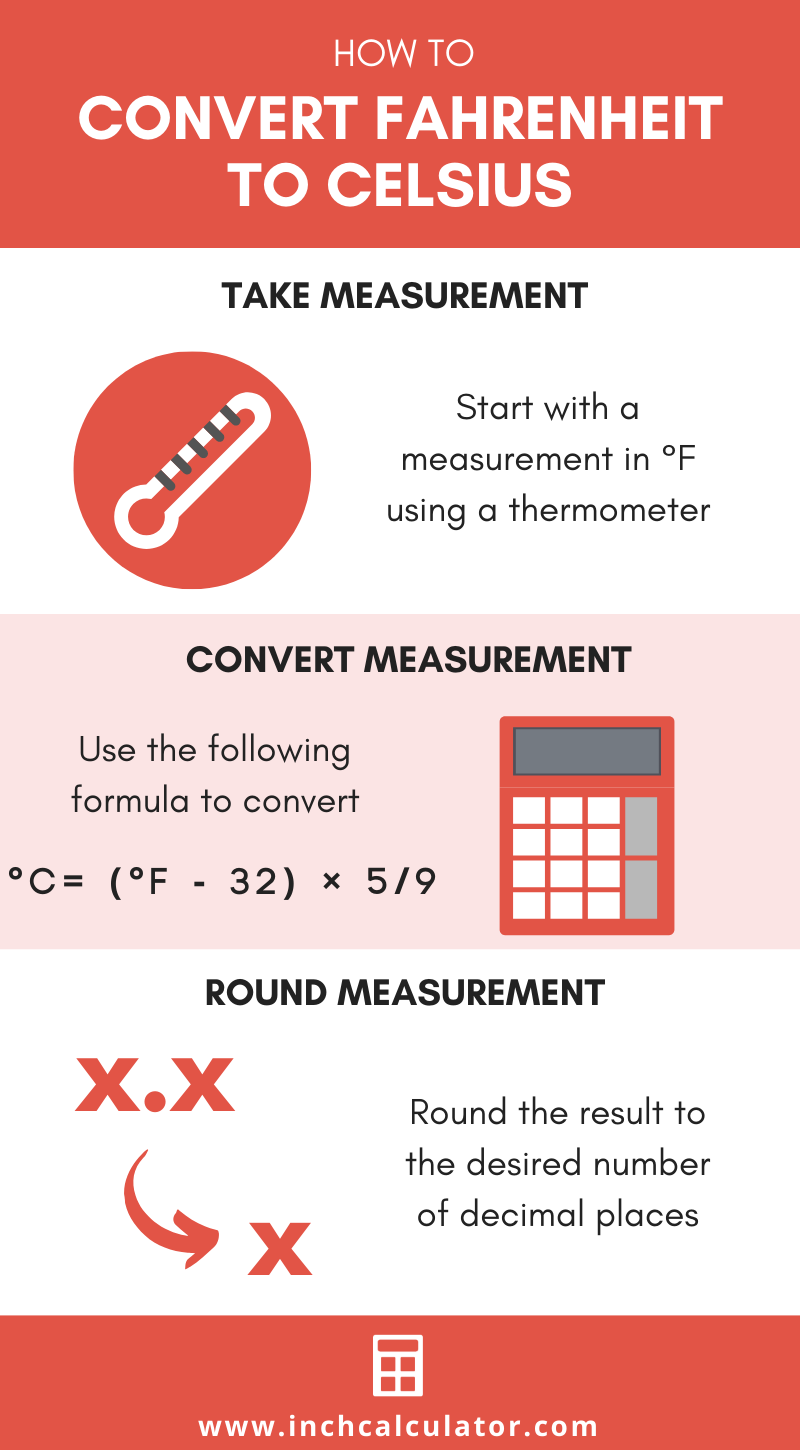Fahrenheit to Celsius Converter (°F to °C)
Enter the temperature in degrees Fahrenheit below to convert it to degrees Celsius.
Result in Degrees Celsius:
Do you want to convert Celsius to Fahrenheit?
How to Convert Fahrenheit to Celsius
There are a few formulas that you can use to convert a temperature in degrees Fahrenheit to degrees Celsius.
°F to °C Conversion Formula
Convert °F to °C using the widely accepted conversion formula:
°C = (°F - 32) × 5/9
The temperature in degrees Celsius is equal to the temperature in degrees Fahrenheit minus 32, times 5, divided by 9. Insert the °F temperature measurement in the formula and then solve to find the result.
For example, let's convert 50 °F to °C:
50 °F = (50 - 32) × 5/9
50 °F = 18 × 5/9
50 °F = 10 °C
Alternate Fahrenheit to Celsius Formula
The National Institute of Standards and Technology actually defines the following formula for the conversion:[1]
°C = (°F - 32) ÷ 1.8
Ultimately this is a reduced version of the widely accepted formula shown above.
How to Convert a Temperature Without a Calculator
To convert Fahrenheit to Celsius without a calculator, you can use a simple rule of thumb. Subtract 30 from the temperature, then divide the result in half.
Note that this is not a precise method, but rather a quick shortcut to get a rough conversion when you don't have a calculator handy.
For example, let's use this shortcut to convert 70 °F to Celsius.
Start by subtracting 30 from the temperature.
70 °F - 30 = 40
Then, divide it in half.
40 ÷ 2 = 20
So, 70 °F is roughly equal to 20 °C using this method.
The Fahrenheit and Celsius scales are both used to measure temperature. Read on to learn more about each of them.

Are you converting temperatures or cooking or baking? Try our oven temperature conversion calculator.
Temperature Reference Points In °F and °C
| Temperature | Degrees Fahrenheit | Degrees Celsius |
|---|---|---|
| Absolute Zero | -459.67 °F | -273.15 °C |
| Freezing Point of Water | 32 °F | 0 °C |
| Triple Point of Water | 32.018 °F | 0.01 °C |
| Boiling Point of Water | 212 °F | 100 °C |
| Surface of the Sun | 10,100 °F | 5,600 °C |
Other Common Temperatures
What Is Fahrenheit?
The Fahrenheit scale is a temperature scale that defines the melting point of water as 32 degrees and the boiling point of water at 212 degrees.[2] There are 180 intervals between 32 °F and 212 °F, each corresponding to one degree.
The degree Fahrenheit is a US customary and imperial unit of temperature. Fahrenheit can be abbreviated as F; for example, 1 degree Fahrenheit can be written as 1 °F.
Learn more about Fahrenheit.
What Is Celsius?
The Celsius temperature scale, also commonly referred to as the centigrade scale, is defined in relation to the kelvin. Specifically, degrees Celsius is equal to kelvins minus 273.15.[1]
The degree Celsius is the SI derived unit for temperature in the metric system. A degree Celsius is sometimes also referred to as a degree centigrade. Celsius can be abbreviated as C; for example, 1 degree Celsius can be written as 1 °C.
Learn more about Celsius.
Fahrenheit to Celsius Conversion Chart
| Fahrenheit | Celsius |
|---|---|
| -50 °F | -45.56 °C |
| -40 °F | -40 °C |
| -30 °F | -34.44 °C |
| -20 °F | -28.89 °C |
| -10 °F | -23.33 °C |
| 0 °F | -17.78 °C |
| 10 °F | -12.22 °C |
| 20 °F | -6.6667 °C |
| 30 °F | -1.1111 °C |
| 32 °F | 0 °C |
| 40 °F | 4.4444 °C |
| 50 °F | 10 °C |
| 60 °F | 15.56 °C |
| 70 °F | 21.11 °C |
| 80 °F | 26.67 °C |
| 90 °F | 32.22 °C |
| 100 °F | 37.78 °C |
| 110 °F | 43.33 °C |
| 120 °F | 48.89 °C |
| 130 °F | 54.44 °C |
| 140 °F | 60 °C |
| 150 °F | 65.56 °C |
| 160 °F | 71.11 °C |
| 170 °F | 76.67 °C |
| 180 °F | 82.22 °C |
| 190 °F | 87.78 °C |
| 200 °F | 93.33 °C |
| 300 °F | 148.89 °C |
| 400 °F | 204.44 °C |
| 500 °F | 260 °C |
| 600 °F | 315.56 °C |
| 700 °F | 371.11 °C |
| 800 °F | 426.67 °C |
| 900 °F | 482.22 °C |
| 1,000 °F | 537.78 °C |
References
- National Institute of Standards and Technology, SI Units – Temperature, https://www.nist.gov/pml/owm/si-units-temperature
- National Oceanic and Atmospheric Administration National Weather Service , Fahrenheit, https://w1.weather.gov/glossary/index.php?word=fahrenheit

